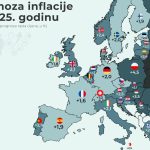ZAGREB, June 12, 2018 – Central European Initiative (CEI) foreign ministers discussed European Union enlargement and the migration issue in Split on Monday.
“We summarised the enlargement process situation and welcomed the fact that the EU, for the first time after 15 years, held a summit on that topic in Sofia, Bulgaria,” Croatian Foreign Minister Marija Pejčinović Burić said after the meeting in Split, held as part of Croatia’s CEI presidency. “Croatia’s CEI presidency is an introduction to Croatia’s presidency of the Council of the EU, where European Union enlargement will also be the main topic.”
She said migration was the other important issue discussed in Split. “We concluded that cooperation between (CEI) countries is essential as the migration issue can’t be dealt now, when illegal migrants are coming to the borders. It’s an issue on a much larger scale.”
She said there were new migrant routes but the situation was not as in 2015. “It’s important that there exists an agreement between the EU and Turkey, which is giving good results, and since 2015 many partnerships have been forged, notably with countries in the Sub-Saharan region, which are helping to reduce the number of illegal migrants on the European Union border.”
Pejčinović Burić recalled that the EU had a foundation for Africa, in which Croatia is taking part, and that the money was being directed into countries where crises and wars were breaking out, in order to reduce those crises as well as the number of migrants heading for Europe. She said the EU was preparing a new agreement for Africa and some other undeveloped countries to deter people from embarking on a “difficult journey.”
The Croatian Foreign Ministry said Zagreb would host a summit of CEI prime ministers by the end of the year. CEI comprises Austria, Bulgaria, Croatia, the Czech Republic, Italy, Hungary, Poland, Romania, Slovakia, Slovenia, Albania, Bosnia and Herzegovina, Montenegro, Macedonia, Moldova, Serbia, Ukraine, and Belarus.
On the fringes of the Split meeting, Pejčinović Burić met with Italian Foreign Minister Enzo Moavero Milanesi, whose country will take over the CEI presidency in 2019. The two ministers confirmed the willingness to continue the bilateral dialogue and exchange views on numerous issues of bilateral, European and global significance, the ministry said, adding that the two ministers underlined the importance of keeping and ensuring the highest level of protection of ethnic minority rights.
Pejčinović Burić said CEI would mark its 30th anniversary next year. She said “big tectonic changes” had taken place in Europe in that time and that it was necessary to adapt CEI to “the requirements of the time.” “Austria has informed us that it will pull out of the Central European Initiative next year. That’s the policy of Austria’s new government which, reviewing its memberships, has decided that Austria’s CEI membership is not a priority for them at this time,” she said.
CEI Secretary-General Giovanni Caracciolo di Vietri told reporters he was not surprised by Austria’s decision because things in Europe were changing. Austria is withdrawing in a friendly way. We will continue to cooperate, but CEI is no longer their priority right now. We are continuing the connection and cooperation with the other states. The conviction and the firmness with which the Italian and Hungarian foreign ministers, as well as other ministers, confirmed that they want to continue this cooperation is strong proof that this initiative will continue, he said.
Asked how Italy’s new government would impact the handling of the migrant crisis, he said Italy had already paid a high price. We all need a European refugee strategy and we will have to achieve European cooperation, instead of Italy always bearing the biggest burden, he added.
The CEI ministers adopted a joint statement welcoming the progress achieved by CEI member states which are not EU member states on closer relations with the EU. The ministers encourage those countries to make additional efforts in order to meet the EU accession requirements and further develop their partnership with the EU, the statement said.
The ministers underline the importance of respecting the rule of law, fundamental rights and responsible governance, which are fundamental values for democracy and a key criterion for EU enlargement and the neighbourhood policy, the joint statement said.







